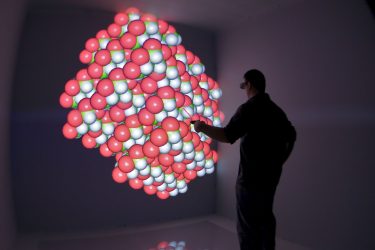
Kevin Ponto is an Assistant Professor of Design Studies and a faculty member in the Living Environments Lab. He received his B.S. in Computer Engineering from the University of Wisconsin–Madison, his M.S. from the University of California, Irvine, and his Ph.D. from the University of California, San Diego. Kevin has a long history of multidisciplinary studies. He has exhibited artistic work while in the Arts Computation Engineering program at the University of California, Irvine. He has also worked on projects to rediscover a lost Leonardo da Vinci painting, locate the tomb of Genghis Khan, and facilitate natural methods for the public to explore cultural heritage artifacts in the Center of Interdisciplinary Science for Art, Architecture and Archaeology at the University of California, San Diego.
What do you work on at WID?
As part of the Living Environments Laboratory, I work on methods to utilize virtual reality technologies for the purposes of health. My research focuses around the human experience of immersive data visualization. We study methods to enhance, understand and communicate a user’s experience in a virtual environment. My secondary research interest is in the areas of wearable computing, smart clothing, and technology. Both of these research areas span across the boundaries of traditional disciplines.
Tools for analysis?
As much of our analysis has to do with visualization, our lab often writes our own analysis software. For example, I have written my own software to visualize and analyze screenplays, camera movements, and virtual experiences. Outside of custom written software, I tend to use the R statistical software. I have found that the power and flexibility that R enables outweighs its interface limitations.
Tools for writing?
I started using overleaf (at the time, writelatex) last fall and have come to really enjoy it. Previously, I had used LaTeX documents using versioning software, but this approach showed limitations in collaborative writing. Additionally, I use Google Docs for my non-latex based writing.
Tools for collaboration?
I mainly use git and mercurial for collaborative coding and writing. Much of my collaborative writing utilizes overleaf and google docs. I have also utilized wordpress blogs for collaborative student learning. This enables students to be exposed to a wide variety of fields and interests and see their problems from new perspectives.
Ultimate tool for discovery?
As the world’s problems do not exist within the confines of traditional disciplines, I believe the greatest tool for discovery is the ability to be an interdisciplinary scholar. Over my career, I have worked on projects with individuals in the fields of art, archaeology, biology, computer science, design, engineering, film, nursing and theater. These collaborations have enabled me to take part in projects that range from searching for a lost da Vinci painting, to generating new mediums for performance, to devising methods to improve everyday living.


You must be logged in to post a comment.